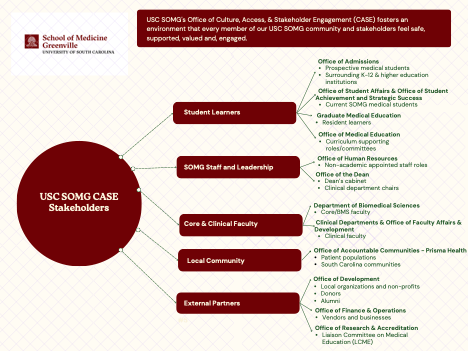Mission
The Office of Culture, Access, and Stakeholder Engagement (CASE) leads and provides guidance for institutional initiatives around supporting and connecting with students, faculty, staff, leadership, and external stakeholders. Intentionally, our office is committed to three key areas:
- Culture – focusing on how faculty, staff, students, and leadership experience our campus and clinical environment and spaces, such that every individual feels valued, supported, and respected;
- Access – through examining our institution’s policies, procedures, and practices ensuring that all faculty, staff, and students are able to acquire the necessary resources, opportunities, and support in reaching their fullest potential;
- Stakeholder Engagement – centering institutional efforts on increasing genuine curiosity, passion, and commitment to our medical school for both internal and external stakeholders from various backgrounds and perspectives.
Vision
Our office fosters an environment where every member of our USC SOMG community and stakeholders feel safe, supported, valued, and engaged.
Guiding Principles:
The University of South Carolina School of Medicine Greenville’s (USC SOMG) goals through 2030 and strategic initiatives may be found here: Strategic Plan. Specifically aligning with strategic initiative four - sustaining excellence - making excellence inclusive is a driving principle of our office.
The Office of Culture, Access, and Stakeholder Engagement is instrumental in supporting and executing our institution’s strategic goals, including advocating lifelong learning, driving innovation, enhancing recognition, and promoting excellence. Consistent with the Inclusive Excellence Change Model developed by the Association of American Colleges and Universities (AACU), the USC SOMG strives to not only demonstrate educational excellence in academic and clinical environments but to also pay close attention in integrating excellence into the fabric, experiences, and landscape of our institution.
In our efforts, we strategically commit to operationalizing inclusive excellence through four guiding principles (Williams, Berger, & McClendon, 2005, p. vi):
- Academics – “a focus on student intellectual and social development;”
- Operations – “a purposeful development and utilization of organizational resources to enhance student learning;”
- Environment – “attention to the cultural differences learners bring to the educational experience and that enhance the enterprise;”
- Community – “a welcoming community that engages all of its [uniqueness] in the service of student and organizational learning.”
Key Stakeholders
The Office of Culture, Access, & Stakeholder Engagement prides itself in collaborating with the below key stakeholders to further the institution’s commitment of inclusivity and belonging. We truly embrace the importance of community in pursuing this important work and in preparing our future physicians in meeting the unique needs of our patient populations.

Scope
Directly associated with the mission and guiding principles of the Office of CASE, our priorities help us remain engaged with our key stakeholders, while demonstrating our dedication to the vision and strategic goals of our medical school.
| Our Priorities and Connection to Our Mission1 | Guiding Principle(s) | Associated Unit(s)2 |
|---|---|---|
|
Culture (C)
|
Operations, Environment, Community |
HR, OSA OSA, HR |
|
Environment, Community Academics, Operations, Environment, Community Operations, Environment, Community |
OSA, GME, BMS, Med Ed, Clinical Faculty Development, SASS, clinical departments OSA, HR, Office of Assessment |
|
Access (A)
|
Academics, Operations, Environment, Community Operations, Environment, Community |
Med Ed, HR, OSA, Clinical Faculty Development HR, OSA, Admissions, GME |
|
Stakeholder Engagement (SE)
|
Community, Operations Environment, Community Operations, Environment, Community |
Office of Development, Office of Finance & Operations, Office of Accountable Communities (Prisma) OSA, HR, student organizations, ERGs Various SOMG units, student organizations, ERGs, clinical departments, community members |
1Some office responsibilities may encompass more than one component of our mission.
2While CASE will lead and/or provide strategic guidance for these aspects, it may be necessary to incorporate the expertise of other units requiring collaboration with relevant offices/stakeholders.
Inclusive Excellence Action Planning
The USC SOMG prides itself in taking a praxis approach to inclusivity and belonging. In furthering our institution’s dedication to making excellence inclusive, our office serves as a strategic partner in working with leaders to infuse this important work throughout their operational units and creating a safe space for all. Each academic year, our executive leaders and clinical department chairs are tasked with assessing the climate and needs of their divisions and working with staff in the Office of Culture, Access, & Stakeholder Engagement to develop, operationalize, and evaluate departmental inclusive excellence action plans (IEAPs). This strategic approach has helped our institution not only emphasize the significance of inclusivity and quality but also has emphasized the vitality of an action-based approach in furthering the important work in which our campus community is consistently engaged.
Contact Us
Do you have a request for the Office of CASE? Submit your request here »
One of our team members will be back in contact with you as soon as possible about your request.
Our office prides itself in sustaining an inclusive environment where every individual regardless of background feels comfortable and included in offering their insight and ideas to make our campus community better. Have an idea? Please feel free to submit your suggestion using this form »